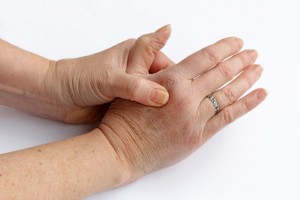

 Rheumatoid arthritis (RA) can be triggered by infections depending on your genetic makeup. The research team of the Arthritis Research U.K. Centre for Genetics and Genomics at The University of Manchester believe their findings can have important implications on the diagnosis and treatment of rheumatoid arthritis.
Rheumatoid arthritis (RA) can be triggered by infections depending on your genetic makeup. The research team of the Arthritis Research U.K. Centre for Genetics and Genomics at The University of Manchester believe their findings can have important implications on the diagnosis and treatment of rheumatoid arthritis.
Some rheumatoid arthritis patients test positive for autoantibodies, while 30 percent remain ‘seronegative’. For the study, the researchers distinguished between the two RA subtypes based on their genetic distinction: seropositive and seronegative rheumatoid arthritis.
The researchers have uncovered that different genetic variants of a protein that largely contributes to the immune system’s ability to fight infection are associated with the two types of RA.
Dr. Steve Eyre from the genetics and genomics center in Manchester commented, “We recognize that rheumatoid arthritis is a complex disease that can have variable presentation and outcomes for different people, in particular, in the way they respond to treatment. These findings add to our ability to genetically define subtypes of rheumatoid arthritis, which is an important step towards selecting the best treatment for each patient.”
Center director Prof. Jane Worthington added, “Now that we have established a genetic basis for these two types of rheumatoid arthritis, we hope it will lead to patients receiving a swifter, accurate diagnosis and more appropriate, targeted treatment. These findings have opened the door to a better understanding of seronegative rheumatoid arthritis.”
As mentioned, there are two types of rheumatoid arthritis: seropositive and seronegative. In seropositive rheumatoid arthritis, the patient tests positive for anti-citrullinated protein antibodies (ACPAs) in the blood. These antibodies are produced against proteins undergoing citrullination, a molecular change in structure. ACPAs are present in 60 to 80 percent of rheumatoid arthritis patients.
In seronegative patients, there are no anti-citrullinated protein antibodies present in the blood.
Confirming the RA diagnosis is easier for the seropositive type. Nevertheless, rheumatoid arthritis can still develop in those who are seronegative.
Along with ACPAs in the blood, seropositive patients also have a common sequence of amino acids called the shared epitope. It is not well understood how this sequence contributes to rheumatoid arthritis, but it has been proposed that the shared epitope attaches to parts of proteins called citrullinated peptides, and this way contributes to the production of anti-CCP antibodies.
Smoking has also been found to be a risk factor for rheumatoid arthritis in those with the shared epitope. Scientists believe the lung inflammation from smoking leads to protein citrullination, which in turns induces anti-CCP antibodies in genetically susceptible people with the shared epitope.
Other differences include risk factors for rheumatoid arthritis and changes in diagnosis. For example, a person with seronegative rheumatoid arthritis may develop a rash, which can change the diagnosis to psoriatic arthritis.
Rheumatoid arthritis risk influenced by low testosterone levels in men
Rheumatoid arthritis (RA) risk is influenced by low testosterone levels in men. Low testosterone levels are seen in both men and women with rheumatoid arthritis, revealing that sex hormones may play a role in the disease. Unfortunately, it is unclear if low testosterone levels are to blame for the onset of rheumatoid arthritis, or it is rheumatoid arthritis that drops the levels of testosterone. Continue reading…
Rheumatoid arthritis raises risk of broken bones in young women
Rheumatoid arthritis (RA) raises the risk of fractures in young women, according to the Mayo Clinic. Although men were also found to have a higher risk of breaking bones, their risk was associated with older age, whereas for women, it was under the age of 50. It has already been established that rheumatoid arthritis patients over the age of 50 face a higher risk of broken bones, but little has been known for those under 50. Continue reading…
Copyright © www.orthopaedics.win Bone Health All Rights Reserved